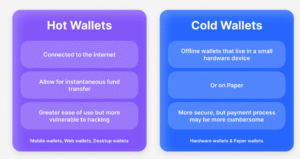Are Hardware Wallets Worth It?
The world of cryptocurrency is exciting and full of potential, but it also comes with its own set of risks. One of the most crucial aspects of navigating this landscape is ensuring the security of your digital assets. As your crypto holdings grow, so does the importance of robust security measures. This brings us to a fundamental question for every cryptocurrency investor: are hardware wallets worth it?
In this comprehensive guide, we’ll delve deep into the world of hardware wallets, exploring their functionality, benefits, drawbacks, and ultimately helping you decide if one is the right choice for safeguarding your valuable digital assets. We’ll cover everything from the basic principles to advanced considerations, ensuring you have all the information you need to make an informed decision.
Are Hardware Wallets Worth It? Understanding Cryptocurrency Security and the Need for Hardware Wallets
Before we dive into the specifics of hardware wallets, it’s essential to understand the inherent security challenges within the cryptocurrency ecosystem. Unlike traditional banking systems, where institutions bear much of the security responsibility, in the world of crypto, you are your own bank. This means you have direct control over your private keys – the secret codes that allow you to access and spend your cryptocurrency.

The Risks of Online Storage
Leaving your cryptocurrency on an exchange or in a software wallet connected to the internet (often called a “hot wallet”) exposes it to various online threats, including:
- Hacking: Exchanges and online wallets are prime targets for hackers looking to steal large amounts of cryptocurrency.
- Phishing Attacks: Sophisticated phishing scams can trick you into revealing your private keys or login credentials.
- Malware: Keyloggers and other malicious software can secretly record your keystrokes and steal your sensitive information.
- Insider Threats: While less common, there’s always a potential risk of malicious activity from within the service provider.
These vulnerabilities highlight the need for a more secure way to store your private keys – offline, away from the constant threats of the internet. This is where hardware wallets come into the picture.
What is a Hardware Wallet and How Does It Work?
A hardware wallet is a physical electronic device, similar in size to a USB drive, specifically designed to securely store your private keys offline. These devices are considered a “cold storage” solution, meaning they are not connected to the internet, thus significantly reducing the risk of online attacks.
Key Features and Functionality
Here’s a breakdown of how hardware wallets work and their key features:
- Offline Storage: The most crucial aspect – your private keys are generated and stored within the secure element of the hardware wallet and never exposed to the internet.
- Transaction Signing: When you want to make a cryptocurrency transaction, you initiate it through a software interface on your computer or phone. However, the transaction is actually signed using your private keys within the hardware wallet. This means even if your computer is compromised, your private keys remain safe.
- Secure Element: Hardware wallets utilize a tamper-resistant secure element, a specialized chip designed to protect sensitive information from physical attacks.
- PIN Protection: Access to the hardware wallet is typically protected by a PIN code, adding another layer of security against unauthorized physical access.
- Recovery Phrase: In case your hardware wallet is lost, stolen, or damaged, you can recover your funds using a seed phrase, a series of 12 to 24 words generated when you first set up the device. It’s crucial to store this recovery phrase securely and offline.
- Multiple Cryptocurrency Support: Most modern hardware wallets support a wide range of cryptocurrencies, allowing you to manage your entire portfolio in one secure device.
Benefits of Using a Hardware Wallet: Why Are Hardware Wallets Worth It?
So, are hardware wallets worth it? Let’s examine the significant benefits they offer:
- Enhanced Security: This is the primary advantage. Keeping your private keys offline dramatically reduces the risk of online theft and hacking.
- Protection Against Malware and Keyloggers: Since transaction signing happens within the hardware wallet, malware or keyloggers on your computer cannot steal your private keys.
- Peace of Mind: Knowing your cryptocurrency is secured in a dedicated offline device can provide significant peace of mind, especially for long-term investors.
- Control Over Your Keys: With a hardware wallet, you have complete control over your private keys, unlike when your crypto is held on an exchange.
- Suitable for Large Holdings: For individuals holding a significant amount of cryptocurrency, a hardware wallet is arguably an essential security measure.

Potential Drawbacks of Hardware Wallets
While the benefits are substantial, it’s also important to consider the potential drawbacks when evaluating if hardware wallets are worth it:
- Cost: Hardware wallets are not free. They typically range in price from around $50 to $300 or more, depending on the features and brand.
- Learning Curve: While generally user-friendly, there can be a slight learning curve associated with setting up and using a hardware wallet, especially for beginners.
- Physical Security: You are responsible for the physical security of the device and, most importantly, your recovery phrase. Losing either can lead to the loss of your funds.
- Transaction Convenience: Compared to leaving funds on an exchange for quick trading, making transactions with a hardware wallet involves a few extra steps of connecting the device and confirming the transaction.
Who Should Use a Hardware Wallet?
Considering the pros and cons, who should consider using a hardware wallet?
- Long-Term Investors (Hodlers): If you plan to hold your cryptocurrency for an extended period, the enhanced security of a hardware wallet is highly recommended.
- Individuals with Significant Cryptocurrency Holdings: As the value of your crypto portfolio grows, the cost and slight inconvenience of a hardware wallet become a small price to pay for superior security.
- Anyone Prioritizing Security: If security is your top concern, regardless of the amount you hold, a hardware wallet offers the best protection against online threats.
Choosing the Right Hardware Wallet: Key Considerations
If you’ve decided that a hardware wallet is right for you, the next step is choosing the right one. Here are some key factors to consider:
- Supported Cryptocurrencies: Ensure the wallet supports the cryptocurrencies you currently hold or plan to invest in.
- Security Features: Look for features like a secure element, PIN protection, and a well-established reputation for security.
- User-Friendliness: Consider the device’s interface and ease of use, especially if you are a beginner.
- Price: Hardware wallets vary in price, so consider your budget and the features that are most important to you.
- Reputation and Reviews: Research different brands and models, read reviews, and choose a reputable manufacturer. Some popular brands include Ledger and Trezor.

Setting Up and Using Your Hardware Wallet: A General Overview
While the specific steps may vary depending on the device, here’s a general overview of how to set up and use a hardware wallet:
- Unboxing and Inspection: Carefully inspect the packaging for any signs of tampering.
- Initial Setup: Connect the device to your computer and follow the on-screen instructions. This usually involves setting a PIN code and generating your recovery phrase. Crucially, write down your recovery phrase on the provided paper and store it in a secure, separate location. Do not store it digitally.
- Installing Companion Software: Most hardware wallets require you to install companion software on your computer or phone to manage your wallet and initiate transactions.
- Receiving Cryptocurrency: To receive cryptocurrency, the software will generate a receiving address. Verify this address on your hardware wallet’s screen before sharing it.
- Sending Cryptocurrency: To send cryptocurrency, you will initiate the transaction in the software, and then you will need to physically confirm and sign the transaction on your hardware wallet by entering your PIN.
Internal Linking Opportunities
Throughout this article, we’ve discussed the importance of securing your cryptocurrency. If you’re ready to take the next step and explore your hardware wallet options, visit our store at directhw.com to browse our selection of secure and reliable devices.
You might also be interested in learning more about:
- Different types of cryptocurrency wallets: Explore the pros and cons of software wallets, paper wallets, and hardware wallets.
- Best practices for cryptocurrency security: Learn additional tips and strategies to protect your digital assets.
- Understanding private and public keys: Gain a deeper understanding of the fundamental security principles of cryptocurrency.

Conclusion: Making the Decision – Are Hardware Wallets Worth It for You?
So, let’s circle back to the initial question: are hardware wallets worth it? Based on our comprehensive exploration, the answer for most cryptocurrency investors, especially those holding a significant amount of digital assets or prioritizing long-term security, is a resounding yes.
While they may involve a small upfront cost and a slight learning curve, the enhanced security and peace of mind they provide are invaluable in the often-risky world of cryptocurrency. By keeping your private keys offline and protected within a dedicated secure device, you significantly reduce your vulnerability to online threats and take control of your digital assets’ security.
If you value the security of your cryptocurrency and want to protect your investment from the ever-present dangers of the online world, investing in a hardware wallet is a smart and responsible decision. Visit today to find the hardware wallet that best suits your needs and take the first step towards truly secure cryptocurrency storage.
FAQ: Frequently Asked Questions About Hardware Wallets
Here are some common questions people have about hardware wallets:
- What happens if I lose my hardware wallet? If you lose your hardware wallet, your funds are still safe as long as you have securely stored your recovery phrase. You can use this phrase to restore your wallet on a new hardware device.
- Can my hardware wallet be hacked? While physical attacks are theoretically possible, they are extremely difficult and require specialized equipment and expertise. The secure element within the wallet is designed to resist tampering. As long as you keep your recovery phrase safe and your PIN secure, the risk of your hardware wallet being hacked remotely is virtually non-existent.
- Do I need to keep my hardware wallet connected to my computer all the time? No, you only need to connect your hardware wallet to your computer or phone when you want to make a transaction. Otherwise, it remains safely offline.
- Are hardware wallets compatible with all cryptocurrencies? No, not all hardware wallets support every cryptocurrency. Before purchasing, make sure the wallet you choose supports the coins you hold or plan to acquire.
- Is it difficult to use a hardware wallet for everyday transactions? For frequent, small transactions, some users might find a software wallet more convenient. However, for larger amounts and long-term storage, the added security of a hardware wallet is well worth the slightly longer process.
- Where should I buy a hardware wallet? It is crucial to buy your hardware wallet directly from the manufacturer or an authorized reseller like . Avoid purchasing from third-party marketplaces or individuals, as the device could have been tampered with.
Ready to secure your cryptocurrency? Visit to explore our range of hardware wallets and take control of your digital asset security today!
